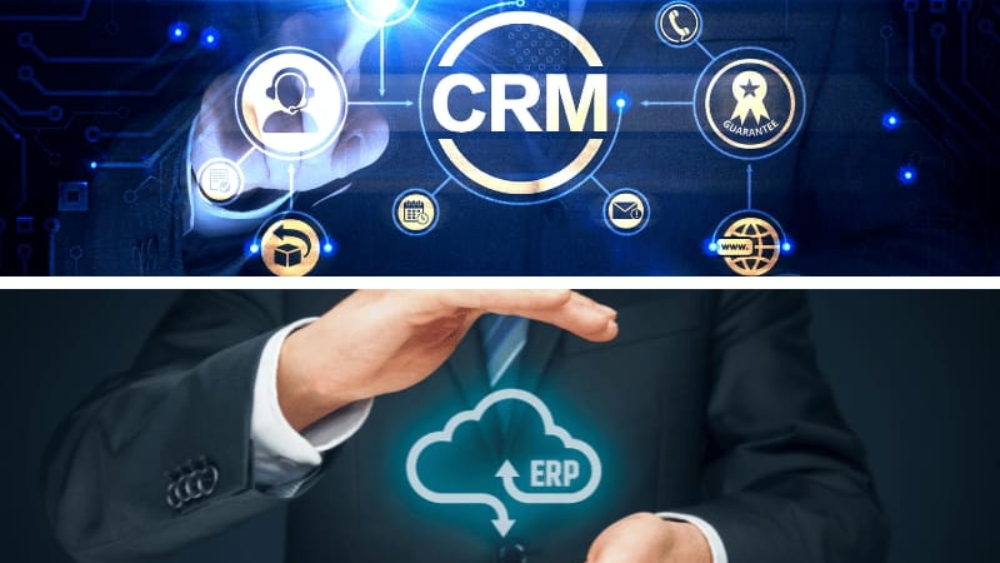Introduction
In today’s rapidly evolving business landscape, managing customer relationships and streamlining internal processes are crucial for sustainable growth and success. Enterprise Resource Planning (ERP) and Customer Relationship Management (CRM) systems are two powerful tools that organizations utilize to optimize their operations. While both ERP and CRM systems aim to improve overall business efficiency, they serve different purposes and offer distinct functionalities. In this comprehensive guide, we delve into the key differences between ERP vs CRM, helping you make an informed decision about which system is best suited for your organization’s needs.
Understanding ERP
What is ERP?
ERP, short for Enterprise Resource Planning, is a robust software solution designed to integrate and manage various business processes within an organization. It serves as a centralized system that enables seamless communication and coordination between different departments, streamlining operations, and enhancing overall efficiency.
Key Features and Functionalities of ERP
- Financial Management: ERP systems provide comprehensive financial management tools, including accounting, budgeting, and financial reporting functionalities. These features enable organizations to monitor their financial performance, track expenses, and ensure compliance with regulatory requirements.
- Inventory Management: With ERP, businesses can effectively manage their inventory, including procurement, stock tracking, and order fulfillment. Real-time visibility into inventory levels helps optimize stock control, minimize carrying costs, and prevent stockouts.
- Human Resources: ERP systems often include modules for managing HR processes such as employee records, payroll, benefits administration, and performance management. These features streamline HR operations, enhance workforce productivity, and facilitate talent management.
- Supply Chain Management: ERP systems enable organizations to efficiently manage their supply chain activities, such as procurement, logistics, and supplier relationship management. By optimizing the supply chain, businesses can reduce costs, improve delivery times, and enhance overall customer satisfaction.
Benefits of Implementing ERP
- Streamlined Processes: ERP integrates various business functions, eliminating data silos and enabling seamless communication and collaboration across departments. This streamlining of processes reduces duplication of efforts, minimizes errors, and improves overall productivity.
- Data Visibility and Decision-making: ERP systems provide real-time access to accurate and up-to-date data, empowering organizations to make informed decisions. With comprehensive dashboards and reporting tools, key stakeholders gain valuable insights into business performance and can identify areas for improvement.
- Improved Customer Satisfaction: By streamlining operations and enhancing productivity, ERP systems enable organizations to deliver superior customer service. Timely order fulfillment, accurate inventory information, and efficient customer support contribute to overall customer satisfaction and loyalty.
Understanding CRM
What is CRM?
CRM, or Customer Relationship Management, is a software solution specifically designed to manage and nurture customer relationships. It focuses on the customer lifecycle, from lead generation to acquisition, retention, and support, aiming to enhance customer satisfaction and drive revenue growth.
Key Features and Functionalities of CRM
- Contact Management: CRM systems provide a centralized database for storing and managing customer information. This includes contact details, purchase history, preferences, and communication records. Having a comprehensive view of customers allows organizations to personalize interactions and deliver tailored experiences.
- Sales and Pipeline Management: CRM platforms offer tools for managing the sales process, tracking leads, and forecasting revenue. Sales teams can track customer interactions, manage opportunities, and monitor sales performance, empowering them to make data-driven decisions and close deals effectively.
- Marketing Automation: CRM systems often incorporate marketing automation functionalities, including email campaigns, lead nurturing, and analytics. These features enable organizations to automate marketing workflows, segment their audience, and measure campaign effectiveness.
- Customer Support: CRM systems provide ticketing systems, knowledge bases, and self-service portals to facilitate customer support interactions. By centralizing support processes, organizations can resolve customer issues promptly, leading to increased customer satisfaction and loyalty.
Benefits of Implementing CRM
- Improved Lead Conversion: CRM systems enable organizations to track and nurture leads effectively, ensuring that sales teams focus their efforts on qualified prospects. By providing a systematic approach to lead management, CRM systems increase conversion rates and drive revenue growth.
- Enhanced Customer Engagement: With CRM, businesses can deliver personalized and targeted communications to customers based on their preferences and behavior. This personalized engagement strengthens customer relationships, fosters loyalty, and increases customer lifetime value.
- Efficient Sales Processes: CRM platforms streamline sales workflows, automating manual tasks and providing sales teams with valuable insights and analytics. By eliminating administrative burdens, sales representatives can focus on building relationships and closing deals more efficiently.
ERP vs. CRM: Key Differences
While ERP and CRM systems share the common goal of optimizing business processes, they cater to different aspects of an organization’s operations. Here are the key differences between ERP and CRM:
- Focus: ERP systems primarily focus on internal processes and operations, such as finance, inventory, and HR management. On the other hand, CRM systems concentrate on managing customer interactions, sales, and marketing efforts.
- Data Scope: ERP systems handle comprehensive data encompassing the entire organization. They integrate various departments and functions, providing a holistic view of operations. In contrast, CRM systems mainly deal with customer data and activities related to customer acquisition, retention, and support.
- Functionality: ERP systems offer a wide range of functionalities, including financial management, inventory control, and supply chain optimization. CRM systems, on the other hand, provide features for contact management, lead tracking, sales automation, and customer support.
- User Base: ERP systems are typically utilized by employees across various departments, including finance, operations, and HR. CRM systems, on the other hand, are primarily used by sales, marketing, and customer support teams.
Conclusion
In conclusion, understanding the differences between ERP and CRM systems is vital for organizations seeking to optimize their operations and enhance customer relationships. ERP systems focus on integrating and streamlining internal processes, while CRM systems concentrate on managing customer interactions and driving sales growth. By carefully evaluating your organization’s needs and objectives, you can determine whether implementing an ERP or CRM system—or both—will best support your business goals. Embracing these powerful tools can provide a significant competitive advantage in today’s fast-paced business environment.

